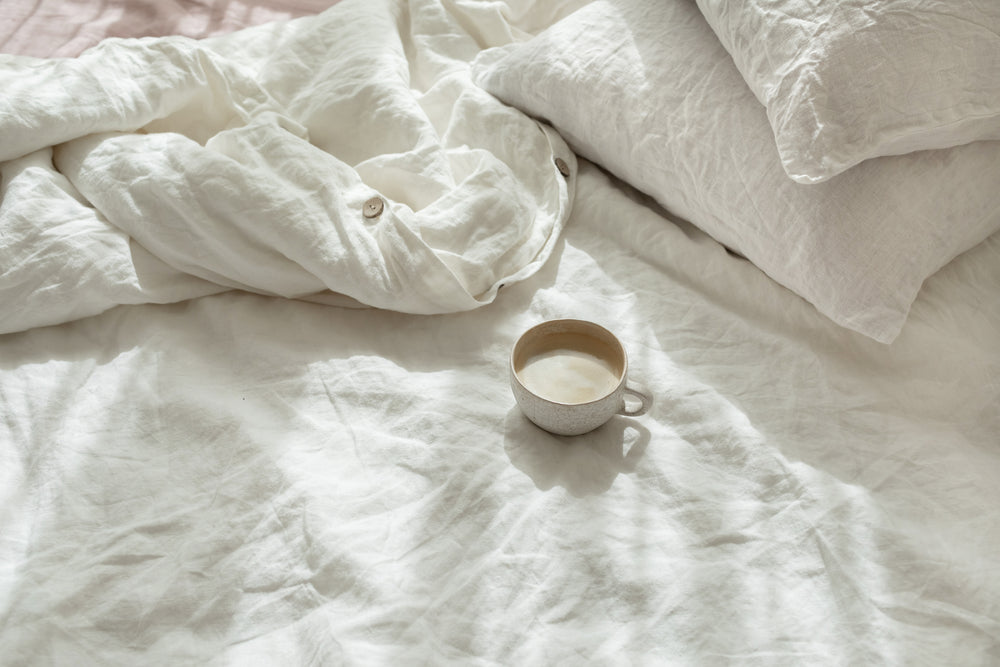Free U.S. Shipping On Orders Over $150

Everything You Need to Know About Linen Sheets
Posted on
When many people think about natural or organic bed sheets, they automatically think cotton. But cotton is not the only good option when you are shopping for high quality bed sheets. Linen sheets are some of the best natural/organic sheets you can get. They have plenty of advantages over cotton and they are super comfortable to sleep on.
In this post, we break down everything you need to know about linen sheets including how they are made, how comfortable they are and how to take care of them.
By the way, if you are also interested in silk sheets, we also have a guide to the best silk bed sheets.
What Are Linen Sheets Made From?
Linen fabric is made from the flax plant, specifically the cellulose fiber that’s found inside the stalks of these plants. If you want to go deep into the fascinating harvesting and manufacturing process, watch this YouTube video.
Linen is one of a few types of all-natural materials used to make bed sheets. The others are silk, hemp and cotton.
Note that while linen sheets are natural, not all of them are organic, meaning no harsh chemicals were used in their growing or processing. Non-organic linen sheets are typically only labeled as natural while organic sheets will usually be labeled as GOTS-certified organic.
Are Linen Sheets Any Good — Pros of Linen Bed Sheets
Linen sheets are really good. They have their downsides, and we’ll discuss those shortly, but they are some of the most comfortable bed sheets you can get.
Linen sheets can feel a bit rough and stiff at first, but they quickly soften with each wash (you should feel a notable difference in texture after 2-3 washes). After some time, they feel soft, supple and smooth. Alternatively, you can buy pre-washed (or stone washed) linen sheets. They come already feeling soft.
The other big advantage of linen sheets is breathability and cooling. Linen is more breathable than cotton, making it an excellent choice for hot sleepers. It’s also great for night sweats as it quickly absorbs sweat and dries quickly. So it doesn’t stay damp.
This makes linen sheets a good choice for menopausal women. They will help you sleep cooler and keep you from getting clammy with sweat.
Here are more advantages of linen sheets.
- Linen is incredibly durable, typically lasting 5 years or more. With good care, a set of linen sheets can easily outlast cotton sheets.
- Linen is naturally hypoallergenic, making it a good choice for people with allergies and respiratory conditions. The looser weave (compared to cotton) of linen bedding also means that it traps less particulates and allergens.
- Linen bedding is sustainable and eco-friendly.
Downsides of Linen Bed Sheets
The main downside of linen bed sheets is the price. Like other natural bedding, you’ll pay significantly more for linen sheets compared to polyester or microfiber sheets.
While you can get a set of polyester sheets for under $30, a set of natural linen sheets costs North of $100. But line sheets are worth the premium price.
They are very comfortable, they are breathable, they wick away sweat and they last a long time. So you are essentially paying for years of good sleep, and that’s priceless.
The other common issue with linen sheets is that they wrinkle easily. It’s virtually impossible to keep linen sheets as smooth as cotton or microfiber sheets. But that wrinkled, lived-in look makes linen sheets charming for most people. They have a cozy farmhouse or vintage feel.
How to Clean and Maintain Linen Sheets
Linen sheets are easy to take care of. Change your linen sheets once a week, similar to other types of sheets. This keeps them clean and hygienic, which is especially important if you have allergies or acne-prone skin.
Wash the sheets on a gentle cycle using warm water. Never use hot water as it can cause the sheets to shrink. Use mild laundry soap, ideally formulated specifically for delicate fabrics. Never use bleach or fabric softener on linen as they can cause discoloration and damage.
You can tumble dry linen sheets on a low setting, but air-drying will extend their longevity. Linen dries quickly, so you don't have to wait long for the sheets to dry.
If you are not putting the sheets back on the bed immediately, fold them neatly and store them in a breathable bedding bag. Avoid storing them in any area that traps moisture such as moldy closets or a plastic bin.
Quick links
Contact
6063 Hudson Road #160
Woodbury, MN 55125
Yo@hercLeon.com
Leave a comment: